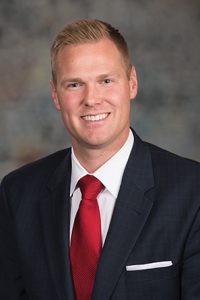Sales tax turnback proposed for sports complexes
Cities could use state sales tax revenue to build sports complexes under a bill heard Feb. 19 by the Revenue Committee.
Currently, the Sports Arena Facility Financing Assistance Act allows political subdivisions to apply for state assistance to build eligible sports arena facilities.
Under LB39, sponsored by Omaha Sen. Brett Lindstrom, they could use that assistance to build sports complexes — facilities that are used primarily for competitive sports and contain a certain number of sports venues such outdoor arenas or baseball, softball or multipurpose fields.
Lindstrom said the construction of sports complexes would lead to new hotels, restaurants, convenience stores and retail shops built to serve visiting spectators, athletes and their families.
“This is a massive opportunity to collect on sports tourism and [an] economic development tool for communities both large and small,” he said.
The bill would direct 100 percent of state sales tax revenue generated by certain retailers near a sports complex back to the political subdivision.
The turnback would apply to state sales tax collected by nearby retailers that started collecting it during the period of time beginning on the date the project commenced and ending four years after its completion date.
Lindstrom said the provision would ensure that the turnback applies only to the sales tax revenue generated by new businesses.
Jeff LeDent, general manager of Millard United Sports, testified in support of LB39. He said Omaha needs a sports complex to compete with facilities in the Des Moines and Kansas City areas.
LeDent said a proposed sports complex at Tranquility Park in Omaha could host 30 national and regional tournaments every year, drawing nearly 90,000 attendees and generating $78.4 million in direct visitor spending and $4.3 million in state sales tax revenue.
“Sports tourism is a $9 billion a year industry that has exploded in recent years,” he said. “Omaha and all of Nebraska [are] missing out on our true potential … due to [a] lack of sports complexes.”
Kevin Andersen, deputy chief of staff in the Omaha mayor’s office, testified in support of the bill on behalf of the city. He said LB39 would benefit local teams, clubs and the general public in Omaha and communities across the state and help cities build the large facilities needed to attract youth sports tournaments.
“We’re losing our own teams, clubs and families as they travel out of state to communities that host events of this magnitude over countless weekends,” Andersen said, “and they’re taking their dollars with them.”
No one testified in opposition to the bill and the committee took no immediate action on it.

